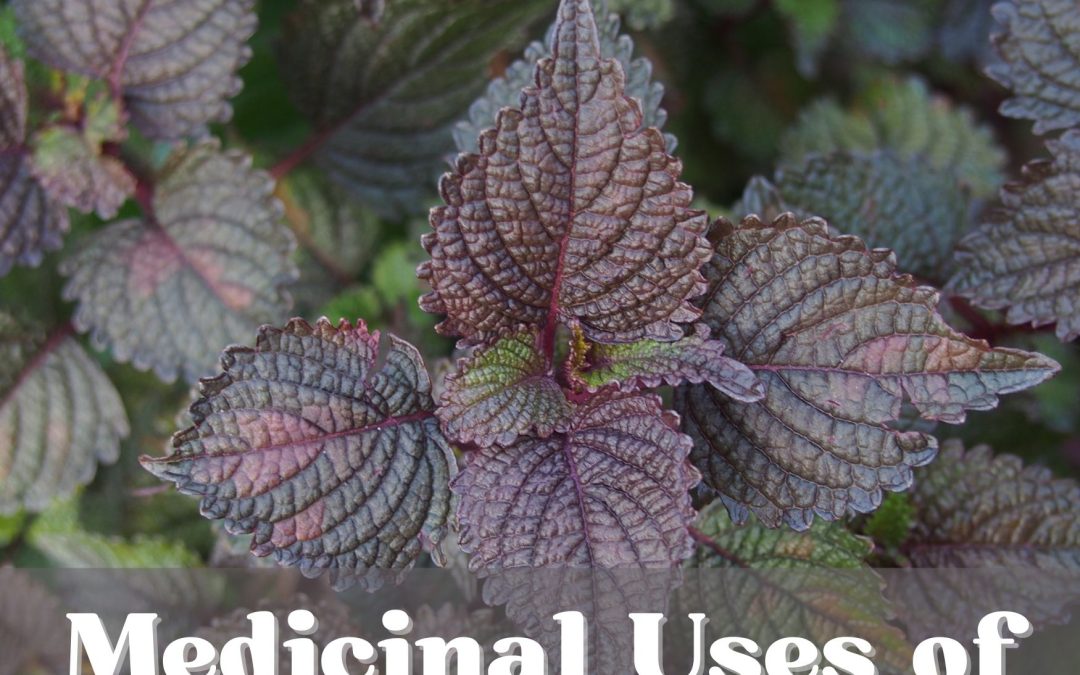This post may contain affiliate links, to learn more about them, check out our Disclosure.
DISCLAIMER: Perilla Mint is toxic to rument animals, so avoid growing it in areas where it can spread and possibly be consumed by them
Perilla mint (Perilla frutescens), also known as shiso or Chinese basil, is an herb widely used in traditional medicine, particularly in East Asian cultures. This versatile plant is not only valued for its culinary uses but also for its numerous medicinal properties. In this article, we will explore the medicinal uses of perilla mint, its benefits, applications, and important precautions to consider.
What is Perilla Mint?
Perilla mint is a member of the Lamiaceae family, which also includes other aromatic herbs like basil, mint, and rosemary. It is characterized by its square stems, serrated leaves, and a distinctive aroma. The plant comes in various varieties, with green or purple leaves, and is commonly used in Asian cuisines.
Medicinal Benefits of Perilla Mint
Perilla mint has been traditionally used in herbal medicine for centuries, offering a wide range of health benefits:
- Anti-Inflammatory Properties:
- Perilla mint contains rosmarinic acid and other polyphenols, which have strong anti-inflammatory effects. These compounds help reduce inflammation in the body, making perilla mint useful in managing conditions like arthritis, asthma, and allergic reactions.
- Respiratory Health:
- In traditional Chinese medicine, perilla mint is commonly used to treat respiratory conditions such as coughs, colds, and asthma. The herb’s expectorant properties help clear mucus from the lungs, making it easier to breathe. It is also believed to help prevent and relieve seasonal allergies.
- Digestive Aid:
- Perilla mint has been used to support digestive health by relieving symptoms like bloating, gas, and indigestion. It stimulates the production of digestive enzymes, promoting better digestion and nutrient absorption. The herb is also used to alleviate nausea and vomiting, particularly during pregnancy.
- Antioxidant Effects:
- Rich in antioxidants, perilla mint helps protect the body from oxidative stress and free radical damage. This can lower the risk of chronic diseases such as heart disease, cancer, and neurodegenerative conditions. Regular consumption of perilla mint may also promote healthy aging.
- Anxiety and Stress Relief:
- The essential oils extracted from perilla mint have been shown to have calming effects on the nervous system. In aromatherapy, perilla mint is used to alleviate anxiety, stress, and insomnia. The herb’s natural sedative properties can help promote relaxation and improve sleep quality.
- Skin Health:
- Perilla mint oil is used topically in skincare products for its anti-inflammatory, antibacterial, and antioxidant properties. It helps soothe irritated skin, reduce redness, and protect against environmental damage. The oil is also effective in treating acne, eczema, and other inflammatory skin conditions.
Applications of Perilla Mint
Perilla mint can be used in various forms, depending on the desired medicinal effect:
- Herbal Tea: Dried perilla mint leaves can be brewed into a tea to help with digestive issues, respiratory conditions, and to provide a calming effect.
- Essential Oil: Perilla mint essential oil can be used in aromatherapy for stress relief or applied topically to the skin to treat inflammation and irritation.
- Tincture: A tincture made from perilla mint can be taken orally to support respiratory health, improve digestion, or reduce inflammation.
- Poultice: Fresh perilla mint leaves can be crushed and applied directly to the skin as a poultice to relieve insect bites, rashes, or other skin irritations.
Precautions and Considerations
While perilla mint is generally considered safe for most people, there are a few precautions to keep in mind:
- Allergic Reactions:
Some individuals may be allergic to perilla mint, especially if they have allergies to other members of the mint family. Symptoms can include skin rashes, itching, or respiratory issues. - Pregnancy and Breastfeeding:
Although perilla mint is traditionally used to relieve nausea during pregnancy, it’s important to consult a healthcare provider before using it, especially in large amounts or as a concentrated supplement. - Interaction with Medications:
Perilla mint may interact with certain medications, particularly blood thinners or medications for respiratory conditions. It’s important to consult a healthcare provider before using perilla mint if you are on any prescription medications. - Overconsumption:
Consuming large quantities of perilla mint, particularly the essential oil, can lead to adverse effects such as nausea, dizziness, or headaches. Always use the herb in moderation.
Perilla mint is a powerful medicinal herb with a wide range of health benefits, from supporting respiratory and digestive health to providing anti-inflammatory and antioxidant effects. Whether used as a tea, essential oil, or tincture, perilla mint can be a valuable addition to your natural medicine cabinet. However, like all herbs, it’s essential to use perilla mint with care, considering any potential allergies or interactions with medications.

